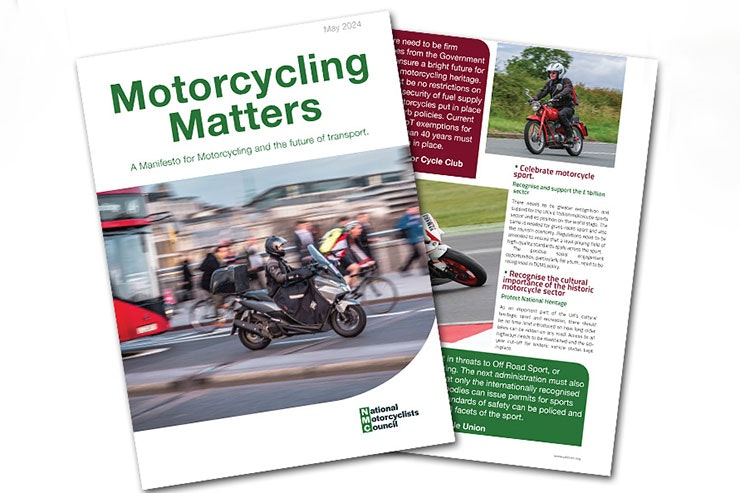NMC campaign points bikes towards General Election agenda
By Ben Purvis
Motorcycle Journalist
17.05.2024
We go to the polls within the next few months to vote in what’s sure to be a viciously-fought General Election that will define the government for the next five years. And it’s an opportunity for motorcycling as a whole – each party is out to claw in every vote it can get and that means there’s a chance to get riding onto the agenda and secure some real improvements going into the future.
The National Motorcyclists Council (NMC) has drawn together a ‘Motorcycling Matters’ manifesto, drafted by its members, that sets out what the next government should be doing to ensure a strong future for motorcycling in the country. And it wants you, the motorcyclists of Great Britain, to help put pressure on candidates standing in your constituencies to make sure they know that riders are an important part of the electorate and one that mustn’t be ignored.
The NMC’s manifesto is boiled down to seven key points, set out as follows:
Transport Choice: Bringing motorcycling into the mainstream of transport policy
The introduction of improved and simplified licensing, training and testing
Safer roads for riding, tackling potholes and proper investment in motorcycle safety.
Adoption of a “technology neutral” approach to decarbonisation, preserving rider choice.
Default access to all bus lanes, continued free parking and protecting motorcycle access to the full road network, including sealed and green roads.
Ensuring greater recognition of and support for the UK motorcycle sports sector.
Recognition of the cultural importance of the classic bike sector and protection for the UK’s motorcycling heritage.
Let’s break those down and have a look at each.
The first point is straightforward. We all know that bikes are more environmentally friendly than cars, reducing congestion and journey times and solving parking problems, but all too often motorcycles are ignored when it comes to setting transport policy and considering where money should be spent.
Second, there’s licencing. Access to motorcycling has become substantially harder since the adoption of the Third European Driving Licence Directive back in 2013, introducing more testing, more licence tiers and more age limits. It’s made no appreciable improvement to safety, though, and in fact the steady improvement in casualty rates leading up to the new regime came to a halt once it was adopted. Despite being outside the EU now, and able to set its own rules when it comes to bike licences, we currently still stick to the same rules as the rest of Europe.
Third, there’s the state of the roads, which are doing a passable impersonation of the surface of the moon. It’s annoying for car drivers, and sometimes expensive when potholes cause damage, but for motorcycles it’s a serious hazard that doesn’t get the attention it needs.
The fourth point, asking for the adoption of a technology-neutral approach to reducing pollution, is important given the consultation that the current government carried out in 2022 into ending the sale of combustion-engine bikes by 2035. More recently, it’s rumoured that a new 2040 end date will be announced, but with battery-electric bikes still far from ready to replace most conventional petrol designs, it’s essential that other technologies, like synthetic fuels, are considered as well.
The fifth point about bus lanes, free parking and access to all roads is self-explanatory and clearly sensible. There’s an ongoing government consultation into allowing bikes into all bus lanes, nationwide, that closes on 9th June, so get your voice heard on that subject by filling it in here.
The sixth and seventh points are more broad, but given the UK’s position as a global hub for motorsport and for classic vehicles, it’s logical to support those industries both from a cultural and an economic point of view.
When is the next general election?
While an election date hasn’t been set yet, the vote can’t be any later than 28 January 2025.
In reality, it might be much sooner than that. While the decision on calling an election is down to the current Conservative government, and polls currently put the Tories substantially behind Labour, it’s received wisdom that elections are best held outside the depths of winter. All the parties rely on volunteer campaigners to help get their messages out and pulling people onto the streets to knock on doors over Christmas and New Year, when the days are short, people are busy and the weather is cold, would be fraught with problems.
Bookies currently have short odds on the vote being held between October and December.
How can I make a difference?
The NMC is asking riders to ask candidates in the election to sign a pledge, on a purpose-made website that shows their support for motorcycling. The pledge itself can be found here. You can go to the ‘Resources for Riders’ page on the same site to see the steps you can take to help make that happen by contacting parliamentary candidates in your area.
NMC Executive Director Craig Carey-Clinch said: “The forthcoming General Election is probably the most important for motorcycling in a generation. We face a situation where, like 1997, all political parties have everything to play for. With a strong likelihood of a change in Government, there is now a real opportunity to reshape the narrative and thinking around motorcycling and send a clear message to candidates about what riders need from a new government.
If you’d like to chat about this article or anything else biking related, join us and thousands of other riders at the Bennetts BikeSocial Facebook page.
Share on social media:
